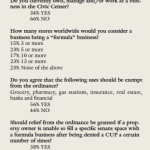Nearly 60 people participated last week in a town hall polling forum for feedback on what they want to see in a Civic Center chain store ordinance—an issue that has pitted Malibu preservationists against free-market business advocates who believe residents’ wallets will determine whether they support chain stores in Malibu.
Under the ordinance, chain stores wishing to open a franchise in the Civic Center would be required to obtain a conditional use permit (CUP) from the city. The ordinance would pertain to the four existing Civic Center shopping centers—Malibu Country Mart, Malibu Village, Malibu Lumber Yard and Malibu Colony Plaza—but would also apply to other shopping center developments currently undergoing environmental review, if they are approved.
Staff hopes to present a draft ordinance to the Planning Commission for a recommendation at its Jan. 22 meeting, in time for the City Council to vote on it by late February. A separate item defining the much-disputed term “community-serving business” will also be heard at the same City Council meeting in February, in case the council wishes to consider a different option such as a commercial diversification ordinance.
“We’ve pretty much built the skeleton [of the formula retail ordinance], but the devil is in the details,” said Associate Planner Joseph Smith at the town hall meeting, which took place Thursday last week at Malibu City Hall. Those details are what staff needed community input on, Smith said.
Tensions between sides in support of an ordinance and pro-free market business groups were already high in what has so far been a divisive debate. An atmosphere of suspicion only seemed to be confirmed by the presence of a court reporter hired by business interests in the Civic Center to record the meeting.
Things got off to a seemingly rough start at the meeting when several in the crowd grumbled about the setup: a list of 20 multiple-choice questions to be answered anonymously via electronic handheld “clickers,” often used in college settings to take attendance in large lecture halls.
The clickers were used to ensure people voted their conscience without being influenced by peer pressure, staff said, but many had expected more of a dialogue format between opponents and proponents, and not an anonymous electronic device to track the group’s answers.
“You should be asking us, not telling us these are the choices,” one audience member said.
The multiple choice questions tackled a range of issues. Several asked about the voters themselves, whether they were Malibu residents and whether they worked or owned businesses in the Civic Center. Others asked attendees to define what a chain or retail formula business is, and whether some types of uses, such as grocery stores or banks, should be granted exemptions from the ordinance. Nearly half of those polled said a chain store’s intensity (i.e., how many people it attracts) is the most important “subjective” aspect in evaluating the site.
Midway through the meeting, progress appeared to be made in curbing the toxic nature of the debate. Encouraged to work with others who did not share the same viewpoint, participants broke off into groups of eight or nine people to come up with adjectives they believe help define the term “community-serving business.” About a dozen attendees, several of whom had been the most partisan either for or against the ordinance earlier at the meeting, left at that point.
After what has been an often shrill tone to the debate over the future of small businesses in Malibu, attendees with both viewpoints said it was refreshing to work collaboratively with the opposite camp.
“To actually hear people talk to one another and hear from the other side is essential,” said Carla McCloskey, a member of the Preserve Malibu group that strongly advocated for a retail ordinance to be drafted.
Marc Persson, executive director for the Malibu Chamber of Commerce, was in attendance and took part in the polling and group workshop. The chamber has been outspoken about its outright opposition to any type of retail ordinance. But Persson said he found the town hall worthwhile.
“I thought it was fantastic, very cordial,” Persson said. However, the chamber, he said, will still have “no reason to change its mind based on its position historically.”
Susan Stiffelman, who also supports the ordinance, said the group workshop was a rare, necessary instance of engagement between opposing sides.
“It meant so much that we were able to sit and chat with each other and I believe we need more of that,” she said.



